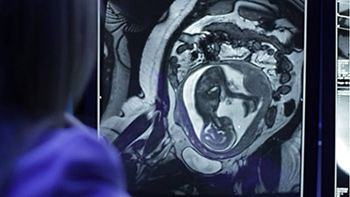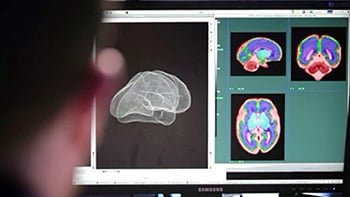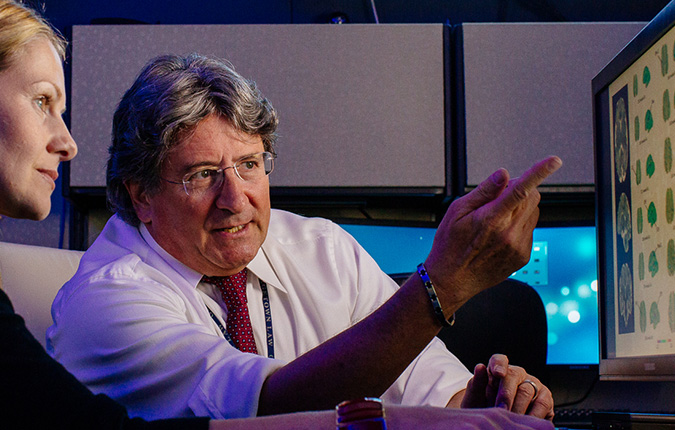
Developing Brain Institute

Conventional imaging and other technologies often cannot detect fetal brain abnormalities early enough in pregnancy for effective diagnosis and treatment. These abnormalities affect the lifelong health, cognitive function and social-behavioral development of the fetus.
Our Providers
Our pediatric specialists provide personalized care for your child’s physical, mental and emotional health needs.
Contact Information
Researchers seeking training or pregnant women who want to learn more about our studies and how to participate can contact our clinical research team.
The Developing Brain Institute, directed by Catherine Limperopoulos, PhD, is housed in the Division of Diagnostic Imaging and Radiology and affiliated with the Zickler Family Prenatal Pediatrics Institute and Newborn Medicine at Children's National Hospital. Our research focuses on the developing brain, both in utero and in the newborn stages of life.
We are developing innovative, noninvasive MRI techniques to measure the structure, connectivity and metabolism of the brain in healthy and high-risk fetuses in ways that cannot be done with conventional MRI or ultrasound studies.
It is our long-term goal to be able to identify unborn babies at risk for impaired brain development as soon as possible, so that the proper interventions and clinical planning can take place. These measures can greatly improve children's health and development at birth and throughout their lives.
The lab's work is focused on the latest diagnostic imaging techniques, research on fetal brain development and clinical trials for pregnant women.
Our lab offers:

- World-renowned research designed to deliver next-generation care: We are one of only a handful of research facilities in North America dedicated to fetal brain research. This unique focus allows us to conduct research that can have a profound impact on prenatal diagnosis and care.
- Pioneering research: Our extensive database of fetal brain development, in both normal and abnormal fetuses, is one of the most robust in the world. This tool provides ample data for researchers to conduct thorough and accurate comparison analyses of fetal brain development.
- Leading fetal brain imaging experts: We train physicians around the world in a wide variety of disciplines, including military personnel, to use quantitative MRI to study the developing brain.
Explore the Frontiers of Human Fetal Brain Imaging in Health and Disease Risk
Catherine Limperopoulos, PhD, discusses new research in fetal brain imaging.

Advanced Fetal Brain Imaging: Our Training and Research
Our team is training professionals throughout the United States and around the world in these groundbreaking technological processes. Through training and research partnerships, we are accelerating our research while finding clinical applications for new techniques to help patients now.
Our ultimate goal is to use our research findings to help guide early medical and surgical care for women with high-risk pregnancies.


Contact Us
Potential Academic Partners
Researchers and professionals seeking training can learn more about our studies and how to collaborate with us by contacting our research team.
Referring Physicians
To refer patients, call the Prenatal Pediatrics Institute and ask for a referral to the Developing Brain Institute for advanced diagnostic imaging.
Pregnant Women
If you are pregnant, learn more about our studies and how to participate by contacting our clinical research team by phone or by email.
Project Onesie
Kiara Crawford and her mother, Michelle Dallas, explain why they decided to enroll Amarie in a research study at Children’s National. This research study seeks to understand how preterm birth affects the cerebellum, a brain region responsible for motor coordination and that also may play a role in attention and language.



News and Highlights
Recent News
News
Pandemic stress reshapes the placentas of expectant moms
Elevated maternal stress during the COVID-19 pandemic changed the structure, texture and other qualities of the placenta in pregnant mothers - a critical connection between mothers and their unborn babies - according to new research from the Developing Brain Institute at Children's National Hospital. Published in Scientific Reports, the findings spotlight the underappreciated link between the mental health of pregnant mothers and the health of the placenta - a critical organ that develops during pregnancy to nourish and protect babies.
News
DC Mother-Baby Wellness boosts resilience for over 1,000 new and expectant mothers experiencing stress, anxiety and depression
An innovative DC Mother-Baby Wellness (DC MBW) program at Children's National Hospital is marking a milestone: prenatal care providers have referred more than 1,000 pregnant women and their babies for mental healthcare support and other essential services, helping some of the area's most strained young families build resilience and improve health outcomes.
News
Pandemic-related stressors in pregnant women may impact their babies before they're born
Prolonged levels of stress and depression during the COVID-19 pandemic contributed to altering key features of fetal brain development, even if the mother was not infected by the virus.
News
Stress, anxiety and depression during pregnancy may hinder toddler's cognitive development
This is the first study to shed light on an important link between altered in-utero fetal brain development and the long-term cognitive development consequences for fetuses exposed to high levels of toxic stress during pregnancy.
News
Low parental socioeconomic status during pregnancy alters early fetal brain development
Maternal socioeconomic status impacts babies even before birth, emphasizing the need for policy interventions to support the well-being of pregnant women, according to newly published research from Children's National Hospital.
News
Maternal anxiety affects the fetal brain
Anxiety in gestating mothers appears to affect the course of brain development in their fetuses, changing neural connectivity in the womb, a new study suggests. The findings could help explain longstanding links between maternal anxiety and neurodevelopmental disorders in their children and suggests an urgent need for interventions to diagnose and decrease maternal stress.







